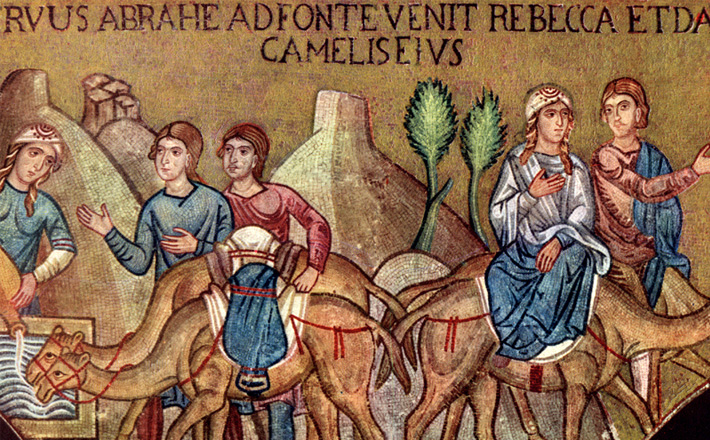Commentary on Matthew 11:16-19, 25-30
Today’s text is really a tale of two passages, each a lesson in confounding expectations.
The string of three weeks of Jesus’ mission discourse ends on the fifth Sunday after Pentecost. By Matthew 11:16, the whole scene has shifted. John the Baptist, now imprisoned, has heard about Jesus and wants to know with certainty that he is Israel’s messiah, so he sends his disciples to ask Jesus directly. What follows from this question about Jesus’ messiahship (11:1-19) centers on the nature of perception: who are John and Jesus?
The crowds appear ready to judge only on the basis of the company these figures keep. John played the part of societal misfit, a throwback prophet whom many supposed was demon-possessed (verse 18). Jesus, on the other hand, associated himself with sinners and tax collectors. Therefore, the crowds concluded, he must be “a glutton and a drunkard” (verse 19). That people are so quick to dismiss a person’s merits on the basis of their perceived “affiliations” is apparently nothing new.
Jesus points out that God’s will has been made known in more than one way, through different kinds of mouthpieces, and yet still isn’t recognized. Jesus’ question is a good one: “What did you come into the wilderness to look at?” (11:7). What are our expectations of a prophet’s vocation or the messiah’s behavior? And how do our expectations, and the little conditions they contain, prevent us from recognizing the will of God in human form?
Of course, these passages remind us precisely of our inability to box Jesus (and John) in, even if, like Peter on the mountaintop (17:4), we are so often ready to build shelters around our understandings of who God’s Son is. Were a savior a mere reflection of the people he saves, we would need to somehow collate a million mirror images. But Jesus points out that divine wisdom defies such categories and is to be judged by deeds not perceptions. As anyone in ministry quickly realizes, there is more than one way to disappoint expectant people!
In the second section of this passage, it is now our expectations of discipleship that are subject to disruption. A noticeable shift in voice and tone occurs in 11:25: “At that time Jesus said…”. The prayer (verses 25-26) and declaration of authority (verse 27) that follow are reminiscent of Jesus’ “high priestly” prayer in John 17. What the crowds could not recognize (verses 16-19) has been revealed to “infants” rather than the “wise and intelligent” (verse 25). In fact, ultimately only the Father rightly perceives the Son (verse 27).
In Matthew’s version (compare to Luke 10:21-22) Jesus adds to this prayer an invitation: “Come to me, all you that are weary and carrying heavy burdens, and I will give you rest. Take my yoke upon you … and you will find rest for your souls. For my yoke is easy, and my burden is light” (Matthew 11:28-30).
These familiar words, recited at commissionings as well as at funerals, strike a new tone. Jesus’ teachings now turn to direct invitation to discipleship. It is tantamount to turning from the narrative world to the reader’s world, what we sometimes call “breaking the fourth wall.” Signaling a kind of turning point in the Gospel, Jesus personally invites us into the drama.
Despite all the warnings about rejection and suffering (10:16-22), Jesus speaks of a discipleship characterized by “rest,” “light” burdens, and an “easy” (or “good”) yoke. Light burdens and easy yokes appear oxymoronic. They produce a tension in our understanding of Matthew’s Gospel, in which Jesus elsewhere reminds disciples that “the gate is narrow and the road is hard” (7:14). In fact, two weeks ago (3rd week after Pentecost) and less than a chapter ago in Matthew we heard a different tone: “whoever does not take up the cross and follow me is not worthy of me” (10:38).
The command to “learn from me” (mathete ap’ emou) is related to the word for “disciple” (mathetes). The invitation to discipleship, however, is more than cognitive learning or overcoming a gap in knowledge; it is the adoption of a way of life. And this way of life is expressed in terms of doing and being something in relation to Jesus. Jesus ultimately grounds the invitation in his relationship with his Father (verse 27). The proper ordering of our relationship to Father and Son can be deemed “light” and “easy” because an improper relationship to them surely makes for a much harder and more restless life!
The promise of rest should not be taken as guaranteed vacation time, but a kind of theological category. The language clearly recalls Moses’s own vocation (Exodus 33:12-17). To ease Moses’s anxiety about the uncertainty of the wilderness journey, God promises to accompany God’s people along the way: “My presence will go with you, and I will give you rest” (Exodus 33:14). God will fulfill the promise for this people whose existence has known little rest (first wandering, later exile and captivity). “Rest” may even recall Creation’s completion (Genesis 2:1-3) but also the loss of rest that characterized life outside Eden. Jesus incredibly offers the rest which only the God of all Creation could extend to a weary Israel longing for the paradisiacal Promised Land.
As disciples, we do not simply attempt to duplicate the actions of an absent master; on the contrary, we rely on the ongoing presence of Jesus himself. This, too, is included in what Jesus means by “rest.” As Matthew reminds us early on, Jesus bears the name of the one promised in Isaiah: Immanuel, “God with us” (1:23). All who take the yoke of discipleship upon them can experience a kind of new creation sustained by the ongoing presence of the Creator in a life of discipleship.
It is only fitting, therefore, that Matthew’s Gospel ends not with Jesus’ departure, but with the assurance of his ongoing presence: “I am with you, even to the end of the age” (28:20). Thus Jesus has effectively taken over God’s promise and in his own life, to which we can become apprenticed, he embodies God’s presence. He can make this invitation because “all authority in heaven and earth” have been given to him (28:18).
It is precisely in a life of discipleship, which includes the making of other disciples (28:19), that Jesus’ presence is guaranteed. If we feel compelled to “bring” or “take” Jesus with us wherever we go, we will find our expectations overturned. Lest we forget who Jesus is, Matthew makes it clear from beginning to end: God with us, even to the end of the age!


July 9, 2017